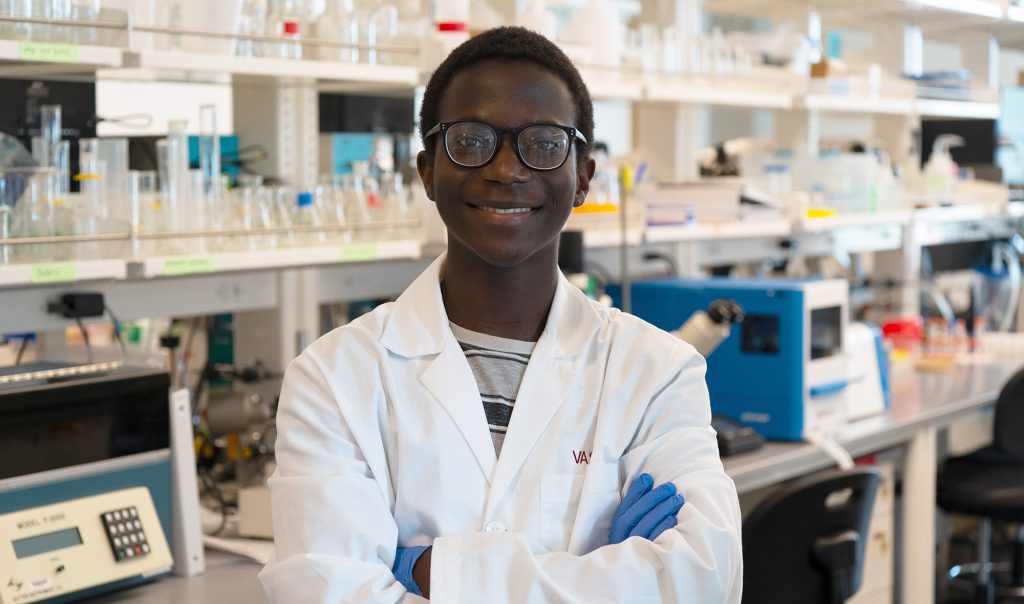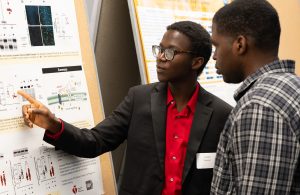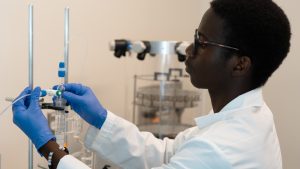
Story and photos by Logan Jackson
- Joseph Oyewsui – sophomore biological sciences and psychological sciences double major
- Mentor: Jaume Padilla, professor of nutrition and exercise physiology

While Joseph Oyewusi knew there were plenty of opportunities to explore his interests at the University of Missouri, there was one primary experience he knew he wanted to pursue – research. Oyewusi was able to participate in a laboratory last year as a freshman and, through the Cherng Summer Scholars program, has led his own project in the same lab this summer.
“I read Ben Carson’s autobiography, Gifted Hands, when I was younger,” said Oyewusi, a sophomore biological sciences and psychological sciences double major. “Through that book, I knew I wanted to get involved in healthcare in some capacity. I eventually landed on psychiatry, but I also knew I wanted to pursue research. I’ve been very fortunate to get involved in a great lab and conduct my own research this summer.”
A nine-week research or creative scholarship program for Mizzou students who are pursuing the Honors Certificate, the Cherng Summer Scholars program allows students to participate in individually designed projects under the mentorship of a Mizzou faculty member. The program is supported by a gift from Peggy and Andrew Cherng and the Panda Charitable Foundation.
“The idea of having people across disciplines come together and share their work is really cool because I believe the exchange of ideas is really important,” Oyewusi said. “It’s vital to broaden your horizons as a researcher, and this program has given me the chance to do just that.”
Oyewusi is working on a project tied to cardiovascular diseases in the context of obesity and diabetes at the NextGen Precision Health building under the mentorship of Jaume Padilla, a professor of nutrition and exercise physiology.

“The research is really interesting, and I’ve definitely enjoyed the opportunity to play a bigger role in the lab,” Oyewusi said. “I think it’s really cool that what I’m working on could potentially help a lot of people.”
Oyewusi’s project is focused on confirming the link between two proteins in vascular cells, iRhom2 and ADAM17. iRhom2 has been shown to guide ADAM17 allowing for fundamental cell signaling by releasing various membrane-bound proteins.
“I am proposing that, in endothelial cells, iRhom2 is essentially a transporter for ADAM17 from the Golgi apparatus, where ADAM17 is activated, to the cell membrane and where it actually does its work,” Oyewusi said.
Oyewusi is conducting his research by using cell culture. After growing the cells, Oyewusi infects them with a virus. He waits a couple of days, collects the cells and runs a variety of tests on the samples he has collected. The primary focus of his work is to see if there is any insulin sensitivity within the samples.
“I actually do quite a bit with the cells I collect,” Oyewusi said. “One of the tests is a nitrite analysis, which shows the amount of nitrite in the sample, which is an indicator of insulin signaling. Reduced signaling is a hallmark of people who have type 2 diabetes.
“I’m diving into all that information and drawing conclusions from the data.”